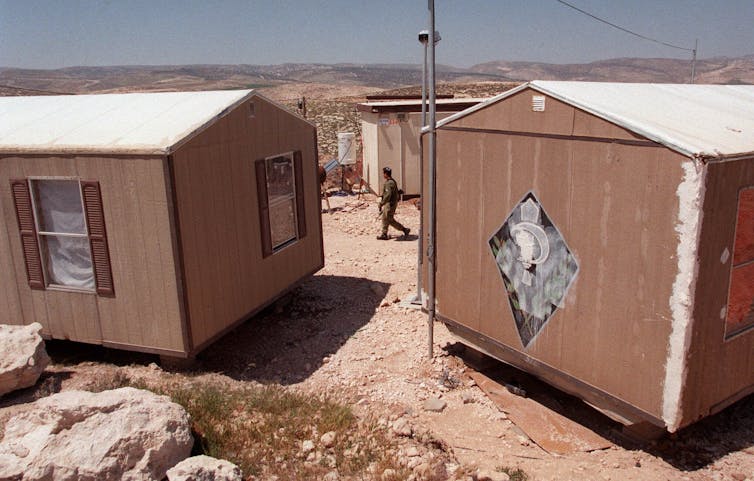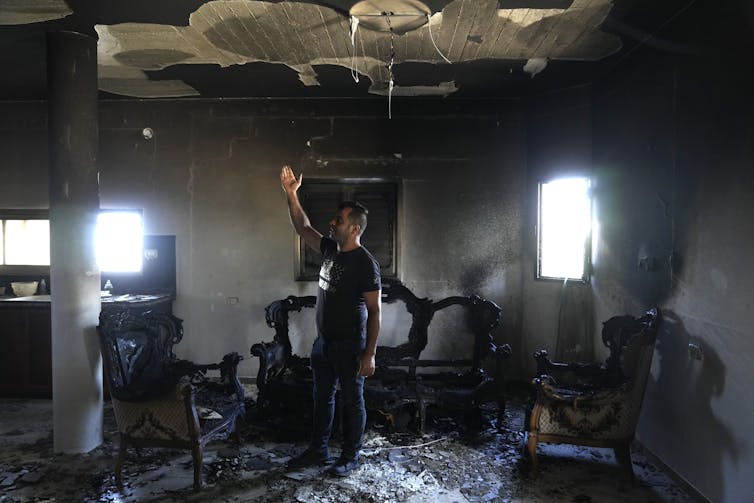(The Conversation) — The increase in settler violence against Palestinians in the West Bank over the past year has been unprecedented. Since Hamas’ Oct. 7, 2023, attack and the start of the war, there have been more than 1,000 attacks, according to a new report from the International Crisis Group.
The spike, which has raised international alarm, is often blamed on the permissive policies of Israel’s right-wing government, led by Benjamin Netanyahu. According to a U.N. investigation, nearly half of all settler attacks documented in October 2023 were conducted in collaboration with, or in the presence of, Israeli military forces.
I have studied Jewish violent extremism for more than 20 years. I would argue these developments result from long processes tied to the erosion of Israel’s democratic foundations – that the seeds were planted long before Netanyahu came to power.
Since the late 1970s, the future of the Israeli settlements in the West Bank has been the country’s most divisive debate. Yet the once-fringe settler movement has arguably become the most influential actor in Israeli politics.
Ideological origins
Israel took over the West Bank, then ruled by Jordan, during the 1967 Six-Day War against its Arab-majority neighboring countries.
Afterward, Israel imposed martial law in the region, yet Jewish settlement in the occupied area began immediately afterward. The first settlements were erected illegally and were allowed to stay on a temporary basis. Eventually, after the right-wing Likud party came to power in 1977, the settlements gained legal status and their number expanded rapidly. Most countries, however, consider them a violation of international law.

A lone soldier guards Mitzpe Danny, a Jewish settlement near the West Bank town of Ramallah, in 1999.
AP Photo/Ruth Fremson
The first groups of settlers, and still the majority of them, are part of the larger religious Zionist movement, which aspires to combine dedication to a Jewish nation-state with religious orthodoxy. These Israelis consider the emergence of the Zionist movement, the establishment of the state of Israel and its subsequent military victories as phases in a holy redemption, which will end with the coming of the Messiah and the establishment of a Jewish kingdom.
Many believe this process can be expedited by restoring a Jewish presence in the West Bank, which is part of the biblical kingdoms of Judea and Israel.
In 1989, West Bank settlers made up less than 2% of Israel’s total population. Today, they constitute close to 6%, despite the fact that the country’s population has doubled.
About 150 settlements are scattered throughout the West Bank, in addition to unauthorized outposts – undermining the possibility of a viable Palestinian state with an undivided, continuous territory. As the government intensified efforts to promote settlement via various subsidies and the development of infrastructure, a growing number of Israelis have moved to the West Bank to improve their quality of life and for financial reasons rather than ideological ones.
Gaining influence
Settlers traditionally had limited representation in Israel’s Parliament. But that changed, thanks to a combination of several strategies.
Historically, the majority of the secular Israeli public was not willing to support Israel’s control over the West Bank for religious reasons. The left’s position is that settlements are an obstacle to peace with the Palestinians and are morally problematic.

Tens of thousands of left-wing activists in Tel Aviv on June 3, 1989, protest vigilante raids by Jewish settlers on Palestinian villages in the occupied territories.
AP Photo/Anat Givon
In order to build support, the settlers movement adopted a complementary narrative, focusing on their communities’ contribution to national security. Activists magnified the settlements’ role as a buffer zone between the Palestinian population living under occupation and the main Israeli population centers. Today, nearly half of Jewish Israelis believe they help strengthen national security.
In addition, the movement likened West Bank settlers to the Zionist pioneers who arrived in Palestine at the turn of the 20th century and founded modern Israel – although many of those original Zionists were staunchly secular. Thus, settlers legitimized their cause by portraying themselves as followers of Israel’s founding fathers.
Simultaneously, the settlers gained power within influential Israeli institutions, including the military. Today, settlers hold prominent positions in the army’s leadership, which may partially explain the often weak response to settlers’ illegal activities.
Settlers’ political standing also rose as a result of their ability to gain positions within the government. They achieved this with the help of sympathetic ministers, by using party primaries to extract appointments and by winning existing officeholders to their cause. As right-wing governments became more the norm, some settler leaders became cabinet members.
A case in point is Uri Ariel. After leading the Yesha Council – a forum of mayors of West Bank settlements – Ariel became minister of construction, as well as minister of agriculture and rural development. Before stepping down in 2019, he promoted the expansion of settlements, as well as initiatives to specifically serve the Jewish population in the region, such as roads, tourist sites and industry.
Legitimizing violence
In the past decade, a militant stream gained increasing popularity within the settlers movement.
Known as “Hardalim” – a combination of the words “ultra-Orthodox” and “nationalist” in Hebrew – this group adopts a more Orthodox religious lifestyle. Adherents are less committed to Israel’s liberal and democratic traditions, prioritizing religious and nationalist values.
Furthermore, its leaders have embraced the followers of Kahanism, a racist ideology promoted by Rabbi Meir Kahane in the 1970s and ‘80s. Kahane proposed extreme policies to promote Jewish supremacy in Israel and the West Bank, such as calls to expel all Arabs from the country or prohibit marriage between Jews and Muslims.
Kahane’s followers also justified violence against Palestinians, teaching that harm to a Jew is a desecration of God’s name and must be avenged.

A Palestinian man stands in his home after it was torched by Israeli settlers in the West Bank village of Jit in August 2024.
AP Photo/Nasser Nasser
Today, some settler leaders – including past and current Parliament members such as Michael Ben Ari and Zvi Sukkot – have also promoted support for extreme policies to secure Israel’s ongoing control and eventual annexation of the West Bank and Gaza. These include population transfer – a form of ethnic cleansing – as well as mass punishment of Palestinian communities.
Ultimate victory
Following 2022 elections, Prime Minister Netanyahu included extremist settler leaders in his cabinet, which signaled to many settlers that violent and illegal acts against Palestinians would be considered legitimate.
In addition, the appointments have further politicized government bureaucracy. The minister of national security, Itamar Ben-Gvir – a former member of the Kahanist movement – has transformed the police force, employing aggressive measures against Palestinians and demonstrators opposing Netanyahu’s government.
Bezalel Smotrich, the political leader of the Hardali stream of the settler movement, now serves as minister of the treasury. Smotrich has pushed to direct more funding to settlements, approve expansions and legalize unauthorized outposts.
Both ministers and their parties have pressured the government to escalate the military campaign in Gaza. Meanwhile, they have expanded restrictions on West Bank Palestinians, such as limiting permits to work in Israel and increasing limitations on movement – reflecting how far Israel must go to restore its democratic ethos.
(Arie Perliger, Director of Security Studies and Professor of Criminology and Justice Studies, UMass Lowell. The views expressed in this commentary do not necessarily reflect those of Religion News Service.)
![]()















